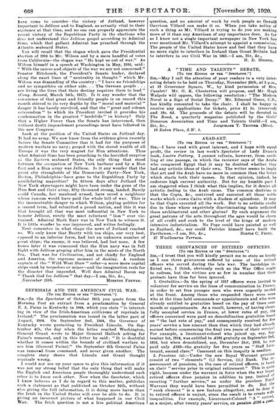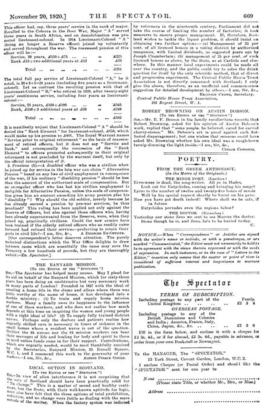THREE GRIEVANCES OF RETIRED OFFICERS. [To ens EDITOR 07 TER
"SPECTATOR."] SIR,—I trust that you will kindly permit me to state as briefly as I can three grievances suffered by some of the retired officers who served during the late war. The hardships in- flicted are, I think, obviously such as the War Office ought to redress, but the victims are GO few in number that their protests have thus far been ignored.
1. Gratuities.—In the spring of 1917 officers were invited Is volunteer for service on the lines of communication in Francs, in order to set free younger men who were urgently needed at the front. Among those who responded there were some who at the time held commands or appointments and who were already entitled to gratuities based on the pay of those coin- mends or appointments. As a result, however, of having cheer- fully accepted service in France, at lower rates of pay, the officers concerned were paid on demobilization gratuities based on "the last rate of pay," and consequently received for five years' service a less amount than that which they had already earned before commencing the final two years of their service! For example, a lieutenant-colonel who joined up, say, Sea" tember 1st, 1914, was entitled to .6105 gratuity on September Ridi 1916, but when demobilized, say. December 31st, 1918, be NO Paid only £103—the gratuity for five years as "Staff Lies- tenant, second class." Comment on this inequity is needless' 2. Pensions (a).—Under the new Royal Warrant pensions consist of two " elements" (i.) Service, (ii.) Rank. The re- assessment of pensions, in the case of retired officers, is based on their "service prior to original retirement." This is One right, because under the warrant in force when the war heel retired officers drew pension in addition to pay, instead counting "further service," as under the previous Berl Warrant they would have been permitted to do. But the "rank element" is a new feature altogether, and to deny. It to retired officers is unjust, since the result is to create wide inequalities. For example, Lieutenant-Colonel "A" refired, as a major, after twenty years' service, on pension ;200 a II"
This officer had, say, three years' service in the rank of major. Recalled to the Colours in the Boer War, Major " A" served three years in South Africa, and on demobilization was pro- moted lieutenant-colonel. In 1914 Lieutenant-Colonel " A" (being no longer a Reserve officer) joined up voluntarily and served throughout the war. The reassessed pension of this officer will be :—
. Service, 20 years, .0150-1-X75 '• £225
Rank .£12-Ftwo additional years at £12 • .1126 Total ... ••• ••• :8261 The total full pay service of Lieutenant-Colonel "4," be it noted, is 20+3+5=28 years (including five years as a lieutenant- colonel). Let us contrast the resulting pension with that of. Lieutenant-Colonel "B," who retired in 1920, after twenty-eight years' continuous service, including four years as lieutenant- colonel :— Service, 28 years, .£150+.£195 Rank, .£150+3 additional years at -£.30 Total ... .C585 It is manifestly unjust that Lieutenant-Colonel " A " should be denied the" Rank Element" for lieutenant-colonel, .2150, which would make up his pension to .£411. The Royal Warrant names "Service prior to original retirement" as the basis of reassess- ment of retired officers, but it does not say "Service and Rank," and consequently the concession of the "Rank Element" to officers promoted subsequently to their original retirement is not precluded by the warrant itself, but only by the official interpretation of it.
3. Pensions (b).—A disabled officer who was a civilian when he joined up for service in the late war can claim "Alternative Pension " based on any toes of civil employment in consequence of the war, if his ordinary "disability pension" should be less than the amount of the authorized scale of compensation. But an ex-regular officer who has lost his civilian employment is ineligible for Alternative Pension, unless the scale of compensa- tion gives him an amount exceeding his army pension plus his "disability "1 Why should the old soldier, merely because he hoe already earned a pension by pre-war services, be thus penalized? This ruling has been applied not only against the Reserve of Officers, but also against those officers who, having been already superannuated from the Reserve, were, when they joined up, practically civilians. Could the new armies have been trained if the elderly retired officers who so readily came forward had refused their services—preferring to retain their
xose posts in civil life?—I am, Sir, Ise., A DISABLED EX-OFFICER.
[Our correspondent's letter deserves attention. The purely technical distinctions which the War Office delights to draw between cases which are essentially the same may save the Treasury a few hundreds of pounds, but they are thoroughly unfair.—En. Spectator.]



































 Previous page
Previous page